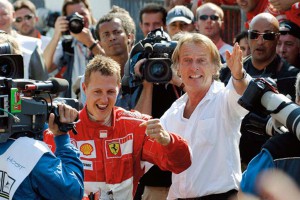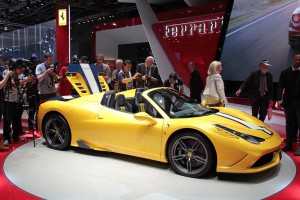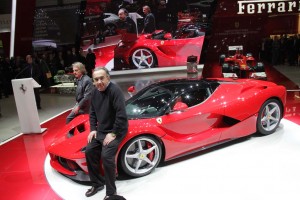Only months after Fiat Chrysler CEO Sergio Marchionne ruled out the possibility of spinning off the maker’s high-profile Ferrari brand, that’s precisely what the maker now says it will do – a move that has fired up investors while raising questions about the long-term strategy for the supercar maker.
In an announcement accompany Fiat Chrysler Automobile’s third-quarter earnings report, the maker said it will sell 10% of Ferrari’s shares while the remaining 90% will go the only recently merged FCA’s own shareholders.
The move comes at a significant moment for Ferrari which just last month revealed that long-time chief executive Luca di Montezemolo would step down, apparently as a result of a dispute with Marchionne over the sports carmaker’s direction. It didn’t help that Ferrari also had one of its worst years on the trying Formula One race circuit in decades.
What happens now is something that both loyal “Ferraristas” and investors alike will be watching closely.
(Chrysler earnings flat for Q3, but investors drive up shares. Click Here for more.)
Industry analysts had long been anticipating a spin-off which “unlocks the value” of the brand, according to Morningstar analyst Richard Hilgert. But Marchionne had repeatedly ruled that out. If anything, he suggested having Ferrari as one of its many corporate brands helped prop up Fiat Chrysler stock.
“All you have to do is do the math” the executive said during a corporate-wide strategy briefing for analysts and the media back in May. “Remember that the next time you look at our balance sheet,” he said when reviewing Ferrari’s overall value to FCA.
In the end, it may be that Ferrari proved more value as a spin-off, suggested Joe Phillippi, chief analyst with AutoTrends Consulting.
FCA “need capital. It’s expensive to play in this game,” Phillippi said, echoing the suggestion by some analysts that the spin-off could help garner support for FCA’s planned $2.5 convertible bond issuance.
Whatever the reason, investors quickly rallied around Fiat Chrysler stock that had been languishing since its launch on the New York Stock Exchange earlier this month, shares traded as FCAU surging by as much as 19% before settling back – though still in double-digit gain territory at midday.
The decision to spin off the maker “will preserve the cherished Italian heritage” of Ferrari, said a statement from FCA Chairman John Elkann. But it also leaves a number of unanswered questions.
The financial intrigue behind the spin-off may have Wall Street chattering, but for Ferrari’s legions of fans, the real question is what happens to the brand itself.
Few nameplates hold as much value – Morningstar’s Hilgert estimating Ferrari could be worth about $7.4 billion – all the more impressive considering the Italian maker sold just 6,922 cars last year, down from a 2012 peak of 7,318.

Michael Schumacher and Luca di Montezemolo celebrate victory during Ferrari's better years on track.
If anything, Montezemolo wanted to keep sales limited to less than 7,000 annually, even though Ferrari had waiting lines of as long as three years for some of its top models. Its new flagship, the LaFerrari, was virtually sold out even before its official unveiling at the 2013 Geneva Motor Show.
(Sales of the world’s most expensive automobiles running at a record pace. Click Here for more.)
While Marchionne appeared to agree with keeping a cap in place, insiders say he was pushing the Ferrari CEO to reach at least a bit higher. The cap was particularly irksome to those who wanted more growth considering Ferrari wasn’t capitalizing on some of the new, emerging markets around the world.
Sales of high-end sports and exotic cars have been “pretty damned robust,” said Phillippi. Compared to the high-volume products sold by FCA’s main brands, like Fiat, Chrysler or Dodge, “it’s a niche market, but one poised for a hell of a lot of growth given China and India.”
It’s all but certain Ferrari will now raise its production plans, though few expect the company, based in Modena, Italy, to completely abandon a cap. Having long lines only enhances its perceived value.
Who will head Ferrari is another question left to be answered. Marchionne is not likely to remain in charge, as he said he would be, at least temporarily, following Montezemolo’s departure.
(For more on Montezemolo’s legacy and departure, Click Here.)
For race fans, the big question is what happens to Ferrari’s F1 program. The maker has been a major force in the global motor sports series since the day Enzo Ferrari went off to create his own company. It dominated the series during the first years of the new millennium, in large part due to the incredible skills of lead driver Michael Schumacher.
Since his retirement from the Ferrari team, however, things haven’t gone nearly as well. And 2014 brought arguably the worst performance on track Ferrari has seen in decades. The failure to rebuild was another sore point between Marchionne and Montezemolo. And how the F1 program performs in the near future is likely to be an indicator analysts, Ferraristas and motor sports fans alike will be watching closely in the next few years.


